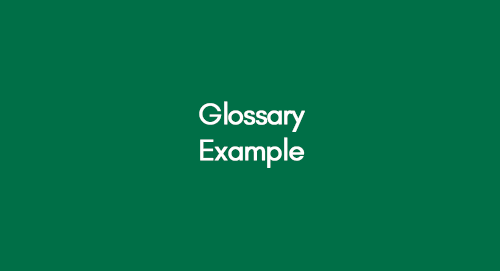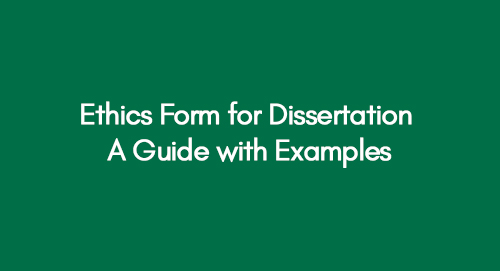
Glossary of Terms Example
May 29, 2023
How to a Create List of Figures | Formatting & Examples
May 30, 2023Have you ever found yourself immersed in a topic only to be halted by unfamiliar terms and jargon? Glossaries are powerful tools that provide concise definitions and explanations for specialised terminology. Also, makes it easier for readers to understand complex subjects.
Find Out Our Primer Dissertation Examples
Review Our Quality Dissertation Topics
This blog will explore the world of glossaries and provide a comprehensive glossary example to showcase their effectiveness. By the end, you'll be equipped to create your own glossaries for your dissertation or research.
Example 1: Effects of Virus on Hospitality and Tourism
Example 2: Impact of Leadership Style on Professional Satisfaction of Nurses: A Case Study
Note: Below is a complete guide with some more examples and tips for you to ace the skill of dissertation writing.
What is a Glossary?
A glossary is a specialised list of terms, phrases, and acronyms commonly used within a particular field, subject, or domain. For example, If you are reading a text containing unfamiliar terms, you can use the glossary to help you understand them. The glossary will provide you with the definition of the term, as well as any other information that may be relevant. It acts as a reference tool, providing concise definitions and explanations to help readers understand unfamiliar terminology.
Importance of Glossaries
Glossaries play a crucial role in enhancing communication and comprehension, particularly in technical, academic, and scientific domains. By defining key terms, glossaries facilitate learning, improve readability, and bridge the gap between experts and novices.
Here are some of the importance of the glossary:
- Improve readability
- Increase clarity
- Save space
- Improve accuracy
- Provide additional information
How to Write a Glossary in a Report: An Example of Glossary
The glossary in a report should include all of the terms used in the document that may not be familiar to the reader. It should provide a brief definition of each term and place it at the end of the report. It is a good practice to include a glossary in any formal report.
You can also include a glossary in a report that does not use technical terms. In this case, the glossary can use to define terms that are specific to your topic.
For example, if you are writing a report about the history of the United States, you might include a glossary of terms such as "Civil War," "Great Depression," and "World War II."
Including a glossary in your report makes your writing more accessible to your readers. By providing a clear message and definitions of the technical term that you use, you can help your readers to understand your report and its findings.
Glossary Example Format
Here is a glossary of examples that will help you write in MLA and APA format to write a dissertation. MLA style focuses on citing sources within the text, while APA style focuses on citing sources on the references page. One or both of these dissertation writing styles may be required depending on the institution or department.
Glossary Sample APA:
Term | Definition |
Accounting | The process of recording, summarising, and reporting financial information. (Kelly, 2001) |
Audit | An independent examination of financial statements and other financial information to determine whether they are free from material misstatement. (XYZ, 2020) |
Balance sheet | A financial statement that shows a company's assets, liabilities, and equity at a specific point in time. (ABC, 2020) |
Glossary Sample MLA:
Term | Definition |
Accounting | The process of recording, summarising, and reporting financial information. (MLA Handbook, 2020, p.23-25) |
Audit | An independent examination of financial statements and other financial information to determine whether they are free from material misstatement. (MLA Handbook, 2020, p.77-80) |
Balance sheet | A financial statement that shows a company's assets, liabilities, and equity at a specific point in time. (MLA Handbook, 2020, p 55-77) |
Conclusion
In this comprehensive guide, we have explored the power and importance of glossaries as tools for enhancing communication and understanding. Glossaries provide concise definitions, explanations, and examples that bridge the gap between experts and novices, making complex subjects more accessible to a wider audience.
An effective glossary includes terms, definitions, examples, pronunciation guides, and cross-references. Each component plays a crucial role in ensuring clarity and facilitating comprehension. Expand your horizons, deepen your understanding, and confidently engage with new and exciting fields. With glossaries by your side, no subject will remain out of reach.




















